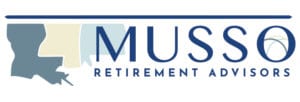Choosing your Financial Advisor


Advisors have many options when managing investments for clients. Each choose a certain method based upon their type of clientele, knowledge of the markets, fiduciary capacity, and experience. Though there is not “one-way” to invest, the approach taken by the Advisor can provide great insight as you decide on who to choose.
The primary question is what role do you want from your Advisor? Someone who accepts an active role in the portfolio management of the assets or rather one who merely facilitates or defers this process to others?
Though trust and likeability are important, this alone does not produce the returns on your assets. Having an experienced money manager overseeing your portfolio and acting as a Fiduciary can prove to be vital and more financially beneficial in the long run. Unfortunately, most do not inquire about the specifics of the Advisor’s strategy in detail as they should.
At Musso Retirement Advisors, we act in a Fiduciary capacity and our portfolios are solely manage assets in a Managed Advisory fee-based manner. With the ever-changing market conditions this active strategy has proven to be advantageous for our clients for over 2 decades.
There are 3 main strategies used today by Advisors: Advisor Managed Wrap Fee Portfolio, Third Party Manager, Buying “A” Share Mutual Funds at NAV.
Advisor Managed Fee Portfolio
- Gives client great flexibility in the types of investments they can hold (stocks, bonds, mutual funds, ETFs, and many more based on client’s preferences and investment experience)
- Portfolio construction is tailored to each client and their specific investment objectives. Gives client the freedom to avoid or pursue certain companies that align with your values
- Able to move to trade to cash in a matter of minutes during volatile markets
- Fees are billed directly to the account based on assets under management
- Trade Fees are absorbed by the financial advisor
- Advisor held to Fiduciary standard
Buying Mutual Fund “A” Shares at NAV
-
In order to qualify for NAV, you can only hold one fund family usually $1mill in a single fund family.
-
When purchased at NAV, there is no up-front commission or fee to the client, however; “A” share mutual funds do carry internal expenses such as 12b1 fees, management fees and other internal expenses. These range from .50% - 1.0%. Trading costs are on top of these expenses and are typically between .20% - .50%
-
Advisor will generally receive .25% per year (beginning year 2) in the from the 12b1 associated with the internal expenses.
-
Advisor receives .25-1% on assets invested at the fund company
-
If you sell these funds within the first year you will face a 1% surrender charge
-
Expense ratios and trading costs are not visible to client but are disclosed in each fund’s prospectus
-
Downside to this strategy is lack of diversification and high internal expenses
-
Advisor receives a commission when mutual funds are purchased
Third Party Money Manager
-
Manager invests assets based on a certain criterion, such as Large Cap/Small-Cap, Growth, Value, or another specific objective
-
Several managers are typically used to create proper diversification
-
Benchmark is the Market Indexes and Peer Group (alike managers in same category)
-
Rebalancing decisions are made by the Third-Party Money Manager
-
Manager and Financial Advisor are both compensated based on assets under management
-
Change of managers may require new paperwork
-
Financial Advisor/Manager absorb trading fees
-
Both the servicing Advisor and the Third-Party Money Manager are held to a Fiduciary standard
IMPORTANT DISCLOSURES:
Investment advice offered through Musso Retirement Advisors, a dba of Advisor Resource Council, a registered investment advisor. Additional information, including management fees and expenses, is provided on our Form ADV Part 2, available at the SEC’s Investment Advisor Public Disclosure website. As with any investment strategy, there is potential for profit as well as the possibility of loss. We do not guarantee any minimum level of investment performance or the success of any portfolio or investment strategy. All investments involve risk (the amount of which may vary significantly) and investment recommendations will not always be profitable. The underlying holdings of any presented portfolio are not federally or FDIC-insured and are not deposits or obligations of, or guaranteed by, any financial institution. Past performance is not a guarantee of future results.
Contact Us
Don't hesitate to get in touch with us.
We would love the opportunity to become your trusted advisor.
